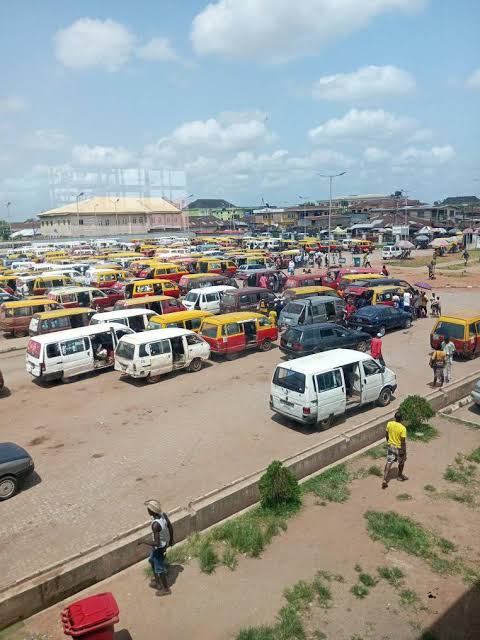
- By Osagiede Best
When you leave too early, you find the parks colourless; the corners and empty spaces whisper from absolute silence and lifelessness. The wonky wooden table of the old watermelon seller, the tyre trails of absent red and yellow buses, the Captain Jack and Chelsea gin sachets and forsaken cigarette butts, all look drained of importance, of use.
When the parks are most alive, it is a beautiful flower, a machine of production, of exchange, of circulation, of millions of mechanical parts working to keep work in motion. Red tomatoes against the golden sun. The horns solo the loud revvings. The laughter and talks pace the afternoon. Hairy nose against stale gutters. Live fast, Age fast. The drivers shout their destinations. The conductors almost dragging the sister on high heels to enter their buses.
The bus parks are portals; they are the images that represent the country’s vomit. The bus conductor represents a low point, a point before madness, to the well-adjusted that crave absolute disassociation with the rejects of the society. In fact, the country’s elites, so also the country as a whole, can define their uneven abundance, refined culture and inflated superiority emotionally through this cross-sectional contrast. This mechanism of comparison and the emotional undertone of varying intensity can be seen in the love of Messi and the hate of Ronaldo, the love of Wizkid and the hate of Davido. Psychoanalysts have found in group psychology how people overinvest a domain, e.g. their socioeconomic, tribal, racial status, and, as if to compensate for this overinvestment, disinvest the so-perceived opposite category. This process is also reinforced by the elites’ comparison within themselves and between the middle class.
The bus conductor, finding their sense of self in lacking respect, lacks respect. Because he feels he is always a target; which he is—for the late, for the upset, for the sad, for the angry and hungry, and of many more, going or coming.
The world is too open to these men these days; they are shown what is denied them. They have smartphones now; they are not only to deal with the jealousy of the breadwinners of their family but also of the people that have the monopoly to respect and dignity all over the globe. They are not blind. They live. They have wives and children. A wife to them is a tool to have children just as the driver is a tool for, at least, breakfast and supper for the rest of the wife’s life. Both scheming to out use the other user in the endless game called USING.
The children will eat, they will depend on you. The social atmosphere can generate intensity of the desire to have children when people start saying ‘you are of age’ but will not bring you money to take care of them. Nonetheless, they have kids every second year and deepen their poverty.
You have to give up trying to look good, you can’t afford it. You give up shaving, you can do without it. You show up in the space where time and energy can exchange for purchase power; you purchase, leave some power for your wife, for your children to purchase, and you go home to wait for tomorrow. Even the cheapest perfume becomes luxury to you.
Here, the demand is created; it necessitates the existence of the lady using a big bowl to sell chelsea and other sachet gins, cocktail of cannabis soaked in gin called monkeytail, and some herbal mixtures they say are for infection, malaria. Others are to strengthen the immune system. Things that make the day blunt, and night, wood.
The old men of the parks cannot keep up with the younger ones. “They don’t know how to load a bus in a queue. They have no patience.”
They also don’t have shame. Or if they do, they do a nice job hiding it. One time, a conductor trying to avoid a female passenger gripping his shirt stripped naked. They do not care about the way they look; the manner in which they speak; the fairness in which they treat their fellow person, and what you think about them. What will the rebel do without laws to fight? In the end, the meaning of life, like in the jungle, is to survive, the odd existentialist said.
Behind some major bus parks are the whore houses. The one at Third Junction, the place where MM Way and Sakponba Road cross each other, is just behind the park. The young drivers and conductors make sure the flow of money gets to the whore house which are also very important to the ecosystem, after they have been heated up on monkeytail and weed, before it goes back to the market women. The poor must breathe, the poor must make love. For “Unless the Penis dies young, it must eat the bearded meat”.
They occupy a very important part of our social structure. They get the women the well-to-do’s do not want. Or the women settle for them. Women like men are commodities in the market of the gods that be. They get the common things. The ordinary. Below this stratum are the beggars. Then the mad people who are strewn about in this ancient city—at least, one for every junction.
On one of my recent visits to the Central Park Obakhavbaye, One of the drivers feels funny, he calls to the Yoruba lady to give him agboh. These people don’t go to the hospital with their two legs. Until they cannot walk, they would rather not pay hospital bills.
Young drivers and bus conductors join gangs; this represses the feeling of helplessness. They avoid their fears and feeling of worthlessness with overwhelming anger. A boy chase another with a machete he hid inside the bus. The other boy breaks a beer bottle.
The tax collectors collect money with wood in one hand and tickets in the other.
There are still the old mothers inside the buses, giving advice to new mothers with their babies tied to their backs. There are still remainders: those that wear underskirts with big pockets, those with waist purses, those that tied their money on the edge of their wrappers, those tireless mothers, relics of sunny yesteryears.
They tell younger drivers to volume down their stereo because of their hearts. They shout their destination every time someone comes down. They always feel they are cheated in the change the conductors give them. They stand with crooked backs by the road as the bus leaves them behind or stops for them, and opens her womb to them to carry them along.
The beggars pray for you when you give them money, sometimes they pray for you when you politely tell them you don’t have. The drivers talk politics before the bus fills up. It is confirmed, the passengers have change. The hundredth ‘last chance’ the conductor has said.
In another bus, a pastor is prophesying for the passengers. A pastor stops prophesying as he is given money. When the preacher is also the passenger, get ready for the sermon that would soundtrack the ride.




Leave a Reply